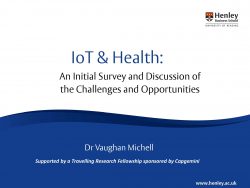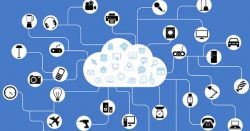 Academic Health Science Networks can play a key role in maximising the potential of the Internet of Things in healthcare.
Academic Health Science Networks can play a key role in maximising the potential of the Internet of Things in healthcare.
That’s the view of Dr Vaughan Michell, of Henley Business School, who discussed the initial results of his research into health applications of the IoT at an event organised by the Oxford AHSN.
Dr Michell defined the IoT as a network of objects (things) to which sensors and/or actuators and processors have been added to enable machine-to-people and machine-to-machine connections over the internet – anywhere, anytime.
In healthcare that covers standalone and wearable devices to measure and monitor patient activity, vital signs and medical conditions and potentially make decisions and take automatic actions. Examples include baby trackers, blood glucose measurement and drug pumps.
Use of IoT can improve patient safety and outcomes through continuous data collection and monitoring, accurate measurement, remote management and increased data personalisation – all in real time. It can also reduce workload and patient demand and increase efficiency, freeing up staff to focus on more complex human-centred care.
Dr Michell examined 20 real world examples of the IoT in the health service in England and Scotland across a range of devices and sensors. He found that in most cases the capabilities of IoT were underdeveloped with most relating to simple tracking and monitoring with the data analysis and decision-making still routed to humans.
There were no IoT examples using advanced features such as automatic control, optimisation or automation of a patient condition or state – but it’s still early days!
Challenges include integration of devices and platforms – there is no standardisation. “It’s like the Wild West,” Dr Michell said. Other hurdles include resolving IoT data standards and quality, sensor limitations, security and safety implications, IoT business models, procurement support, changing working practices, culture and implementation into the health system.
 Academic Health Science Networks could help break through these barriers. Dr Michell said: “AHSNs have a role to play in helping to develop and agree standards and models and promoting and speeding up the use of the Internet of Things through education, coordination and research.”
Academic Health Science Networks could help break through these barriers. Dr Michell said: “AHSNs have a role to play in helping to develop and agree standards and models and promoting and speeding up the use of the Internet of Things through education, coordination and research.”
Professor Gary Ford, Oxford AHSN’s Chief Executive, said: “We simply don’t have the available manpower to be able to go on with humans making every decision. We will have to make a very dramatic shift.”
- Dr Michell spoke on the Internet of Things and healthcare at the Oxford Science Park on 8 February 2018 – read more about this event here
- Download the presentation here
- Dr Michell’s initial research was supported by a travelling fellowship from Capgemini. He plans to carry out a more detailed study and is working on an article and paper on the results
- Dr Michell is a member of the Oxford AHSN Informatics Oversight Group
- Dr Michell is Programme Director – Business Technology Consulting at Henley Business School which is part of the University of Reading – read more here

